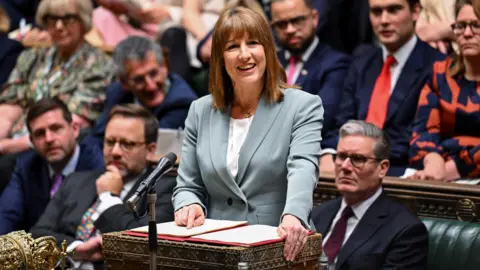Spending review could mean cuts in Wales - experts
 House of Commons/PA Media
House of Commons/PA MediaSome public services are likely to face cuts if the NHS swallows extra funding announced for Wales in Chancellor Rachel Reeves's spending review, experts have said.
There is a warning that "tough choices loom", even though the budget is expected to grow over the next three years.
Labour said it was investing in public services by boosting the Welsh government's budget.
But Plaid Cymru accused Wales' First Minister Eluned Morgan of "asking for very little and getting exactly that".
Welsh Finance Secretary Mark Drakeford said on Radio Wales Breakfast he recognised there "will be trade offs".
The Welsh government can raise taxes, but most of what it spends comes in a grant from the Treasury.
Its funding will be £22.4bn a year on average over the next three years as a result of the spending review.
The Institute for Fiscal Studies (IFS), an independent think tank, said funding for the day-to-day running of public services would grow about 1.2% above inflation.
"While an increase overall, that will likely require tough choices and indeed real terms cuts for some services," the IFS's David Phillips said.
"Increases in funding for the Welsh NHS could easily absorb most, if not all, of this increase."
He said Welsh Finance Secretary Mark Drakeford will "have to decide carefully which areas to prioritise and which to cut back".
About half the Welsh government's budget is already spent on healthcare.
Waiting times for hospital treatment have risen to record highs in recent years.
On Wednesday, the chancellor announced a real-terms increase of 3% to day-to-day funding for the NHS in England.
That will result in extra funding for Welsh ministers to spend as they wish.
However, Guto Ifan from the Wales Governance Centre warned: "If the Welsh government decided to transfer that money to the health service in Wales, which would still be below the historical growth in health spending, it would mean difficult settlements for everything else in the budget.
"I would imagine that the Welsh government would have to make cuts to services outside health under this settlement."
Mark Drakeford told BBC Radio Wales Breakfast: "I recognise that there are choices to be made - that's the nature of being in government, isn't it?
"So we're talking here not about this coming year, we're talking about budgets that will be set from April of next year onwards. There's a very well established process that we have in the Senedd for making those budgets.
"It's beginning now with discussions that I have with my cabinet colleagues, we will lay a draft budget in the autumn and the Senedd will scrutinise that. There will be choices and there will be trade offs, but nothing is inevitable."
He said the situation suggested by the IFS was a "very big if".
Sam Kurtz, of the Welsh Conservatives, said that if the Welsh government did decide it needed to invest all the money in the health service that would be "a problem of Labour's own making" because of the party's struggle to bring down waiting lists.
Plaid Cymru finance spokesperson, Heledd Fychan, said: "Public services, already teetering on the brink in Wales under Labour face further cuts as a consequence of Labour's first minister asking for very little and getting exactly that."
She also criticised figures from the Treasury that suggested the Welsh government's budget for infrastructure was falling by 0.9% in real terms between 2025 and 2030.
"Scotland see an increase, Northern Ireland see an increase but Wales loses out. This 0.9% real terms squeeze in Wales' capital budget is even more proof that this Labour Government and its spending review is nothing but bad news for Wales," she said.
Reeves' spending review reveals how much funding will be available after next May's Senedd election.
She also announced £445m for new rail projects in Wales, following years of complaints that Wales has not had a fair share of spending.
She backed plans for five new stations in Cardiff, Newport and Monmouthshire, and rail upgrades in north Wales.
Opponents said the cash fell short of what Wales needed and criticised a ten-year timeline for the scheme - Welsh Labour politicians said most of the cash would be spent much sooner.
Drakeford became visibly angry with Plaid Cymru leader Rhun ap Iorwerth in the Senedd on Wednesday after ap Iorwerth heckled that the rail cash was over 10 years, pointing out that most of the money would be spent sooner.
Ap Iorwerth told BBC Wales: "The former first minister can reflect perhaps on why he got so angry. I merely put to him that the chancellor a couple of hours previously had made it very, very clear that a sum was coming to wales over a 10-year period.
"The scrutiny is difficult for Labour because they know Wales is being let down here. I'll let him reflect on his actions in the Senedd."
First Minister Eluned Morgan said of the spending review: "Wales will see significant extra investment in rail infrastructure, coal tips safety and Welsh communities will see real benefits that improve lives and create opportunities."
Treasury minister Torsten Bell said there would be "record levels of spending happening in the Welsh government" and said previous Conservative governments "consistently let down Wales" on capital spending which pays for infrastructure.
Welsh Conservative Senedd leader Darren Millar said the amount of rail funding was "shameful".
"Today's rail spending announcement is an insult to the people of Wales," he added.
The TSSA rail union welcomed more funding for rail but said more was needed.
General Secretary, Maryam Eslamdoust, said it fell "short of what is needed and does not even match funding commitments for English cities like Manchester and London".
